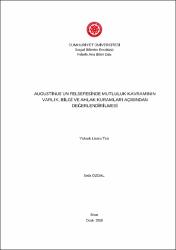| dc.contributor.advisor | Taşkın, Ali | |
| dc.contributor.author | Özdal, Seda | |
| dc.date.accessioned | 2022-04-28T09:20:59Z | |
| dc.date.available | 2022-04-28T09:20:59Z | |
| dc.date.issued | 2018 | tr |
| dc.date.submitted | 2018-01-05 | |
| dc.identifier.other | IX, 101 sayfa | |
| dc.identifier.uri | https://hdl.handle.net/20.500.12418/12583 | |
| dc.description.abstract | Aziz Augustinus, Kilise babalarının en önemlilerinden biridir. O belki de Hıristiyan filozofların en önemli ve etkili filozofudur. Modern ve popüler düşünce üzerinde Aziz Augustinus kadar derin etki bırakan ve düşünceleri uygulanan bir başka filozof yoktur.
Bu çalışmada Augustinus’un mutluluk anlayışı onun ontolojik, epistemolojik ve etik anlayışları açısından tartışılmış ve değerlendirilmiştir.
Aziz Augustinus’un etiği eudaimonist (mutlulukçu) etik olarak kabul edilmiştir. Eudaimonizm Yunancada, genel anlamda “ruh sükûnu” olarak tanımlanır. Bu, ruhen mutlu olduğumuzda, gerçek mutluluğa sahip olduğumuz anlamına gelen bir mutluluktur. Augustinus, aradığı gerçek mutluluğu kendi dönüşümü üzerine bulduğunu söyler. Augustinus’a göre mutsuzluğumuza neden olan temel sorun sevmemiz gereken şeyi sevmememiz ya da severken yanlış yol izlememizdir. Ona göre mutlu olmanın tek anahtarı Tanrı’yı sevmektir.
Ontolojide, epistemolojide ve etikte merkezi anlamda Tanrı vardır.
Augustinus, içimizde olan Tanrı’yı ve mutluluğu bulmak için arayışımızı dış dünyada yaptığımıza işaret eder. Bu da mutluluğu yanlış yerde aradığımız anlamına gelir.
Açıkça belirtmek gerekirse bu hayatta mutlak anlamda mutluluk mümkün değildir. | tr |
| dc.description.abstract | Saint Augustine is the one of the Latin Fathers of the Church and perhaps the most significant and influential of Christian Philosophers. No other philosopher has exerted so deep and so abiding an influence upon popular thought as has St. Augustine.
In this stuty Augustine’s view of happiness has been discussed and evaluated in terms of ontological, epistemological and ethical aspects. His ethics are considered eudaimonstic ethics. The Greeks had a term, eudaimonia, roughly defined as “happiness of soul.” This is the happiness that lasts forever, we can say, when our soul is happy, then we are truly happy. Augustine tells the story of his conversion in such a way that one expects that, upon his conversion, he has found happiness.. according to Augustine, our problem is misplaced loves. We love the wrong things, or we love the right things in the wrong way. According to Augustine, the key to happiness is love of God. .
Augustine points out here that we are always searching the exterior world to find happiness, to find God, when God is within us. This mean is we are looking for happiness in the wrong place.
It is clear that is Complete happiness is not possible in this life. | tr |
| dc.language.iso | tur | tr |
| dc.publisher | Sivas Cumhuriyet Üniversitesi - Sosyal Bilimler Enstitüsü | tr |
| dc.rights | info:eu-repo/semantics/openAccess | tr |
| dc.subject | Augustinus | tr |
| dc.subject | Mutluluk | tr |
| dc.subject | Eudaimonia | tr |
| dc.subject | Tanrı | tr |
| dc.subject | Akıl | tr |
| dc.subject | İnanç | tr |
| dc.title | Augustinus’un Felsefesinde Mutluluk Kavramının Varlık, Bilgi ve Ahlak Kuramları Açısından Değerlendirilmesi | tr |
| dc.type | masterThesis | tr |
| dc.contributor.department | Sosyal Bilimler Enstitüsü | tr |
| dc.relation.publicationcategory | Tez | tr |















